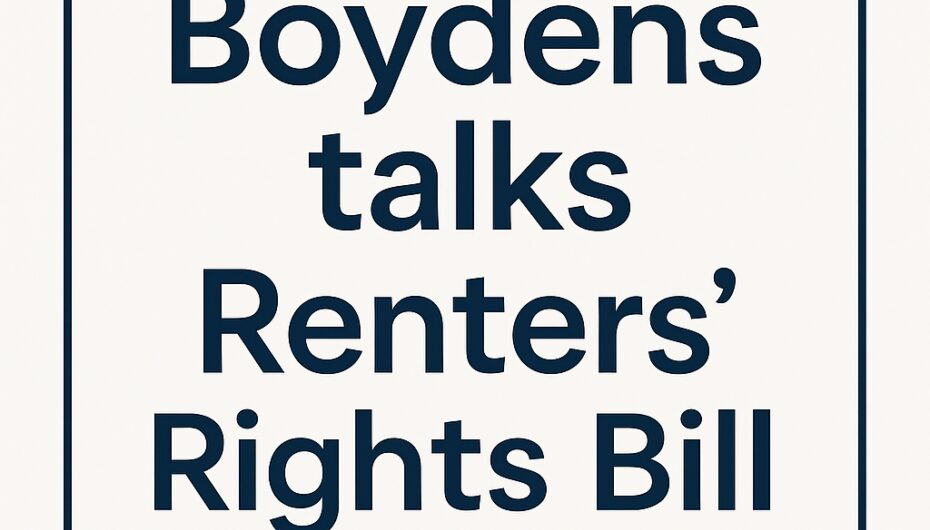 2nd June 2025
2nd June 2025
BOYDENS TALKS RENTERS' RIGHTS BILL
The private rented sector (PRS) is on the brink of one of its biggest transformations in over three decades, and landlords across Essex and Suffolk must be ready to meet the changes head-on.
With the Renters’ Rights Bill making its way through Parliament and expected to come into force between October 2025 and January 2026, now is the time to prepare. For landlords, this landmark legislation brings both challenges and opportunities, from changes to tenancy structures and rent reviews to the abolition of Section 21.
What is the Renters’ Rights Bill?
The Renters’ Rights Bill, introduced in September 2024, is a sweeping piece of legislation aimed at improving standards and security for tenants in the PRS. According to the Government, while many landlords do a good job, the sector still sees affordability issues, inconsistent quality, and a lack of security.
In short, the Bill intends to:
- Abolish Section 21 ‘no-fault’ evictions
- Convert all Assured Shorthold Tenancies (ASTs) into periodic tenancies
- Limit rent increases to once annually via Section 13 notices
- Strengthen Section 8 possession grounds
- Outlaw rental bidding wars
- Introduce a new landlord ombudsman
- Enforce the Decent Homes Standard across all rental properties
- Require a national PRS database for landlords
- Ban blanket discrimination against tenants with children or on benefits
- Make it easier for tenants to rent with pets
Let’s explore the major reforms in more detail.
Periodic Tenancies Will Become the Norm
Gone are the days of 12-month fixed terms. When the Bill comes into force, every AST, whether new or existing, will automatically convert to a rolling, periodic agreement.
For landlords, this means a significant operational shift. Contracts, renewal processes, and rent increase protocols will all need updating.
While the Government says this change empowers tenants, industry data tells another story, over half of tenants still prefer fixed terms for the security they offer.
Section 21 to be Abolished — For Good
The abolition of Section 21 has been a long time coming. Once implemented, landlords will no longer be able to regain possession of their property without a legal reason.
This will place greater reliance on Section 8 notices, where landlords must cite specific grounds for eviction, such as rent arrears or anti-social behaviour. For landlords, understanding these grounds becomes critical, particularly as any misstep can result in a failed court application and prolonged proceedings.
Rent Reviews: Only Once a Year
With periodic tenancies becoming the standard, the only route for increasing rent will be through a Section 13 notice, and this can only be served once every 12 months.
This change will likely affect rent review strategies, particularly in competitive markets. Ensuring rent increases are both fair and timely, and in line with legal requirements, will become a key area where agents add value.
What Else Should You Be Aware Of?
The Bill contains a raft of additional reforms:
- Bidding wars banned – No more offers above asking price.
- Landlord ombudsman – All landlords will be required to join a redress scheme.
- Database transparency – A digital register will include landlord and property compliance history.
- Awaab’s Law applied to PRS – Landlords will face strict deadlines to resolve health hazards.
- Renting with pets – Tenants can’t be unreasonably refused; landlords can ask for pet damage insurance.
- Discrimination outlawed – No more blanket bans on children or benefit recipients.
When Will the Changes Happen?
While the Bill is expected to pass into law before Parliament’s summer recess in July 2025, the implementation will follow later, currently projected between October 2025 and January 2026.
Some reforms, such as the abolition of Section 21 and the switch to periodic tenancies, are expected to be implemented swiftly. Others may be staggered to give the sector time to adapt.
Where Does the Bill Stand Now?
The Bill has completed its committee stage in the House of Lords in mid-May and will soon enter the report stage. Despite hundreds of proposed amendments from peers, the Government has thus far only accepted its own changes, a sign that the core reforms are unlikely to shift.
Once the Bill returns to the Commons for any final adjustments, it will progress towards Royal Assent and ultimately become law.
Final Thoughts: What Should Agents Do Now?
At Boydens, we believe in staying one step ahead. This legislation marks a clear shift in the lettings landscape, and it’s vital that landlords adapt with confidence and clarity.
Here’s how you can start preparing:
- Review your tenancy agreements and start transitioning to periodic-friendly formats
- Familiarise yourself with Section 8 grounds and rent review protocols
- Stay informed as the Bill progresses, timelines may shift
- Attend Boydens FREE webinars
Above all, don’t wait until the last minute. These changes will affect how we all operate, but with the right preparation, they also offer a chance to elevate standards across the board.
Need guidance navigating the Renters’ Rights Bill?
Whether you're a landlord looking for clarity or a tenant with questions about your rights, our experienced lettings team is here to help. With local knowledge built over decades and an eye on the future, Boydens is ready to support you every step of the way.
📞 Contact your local Boydens office today or visit boydens.co.uk for the latest updates.







